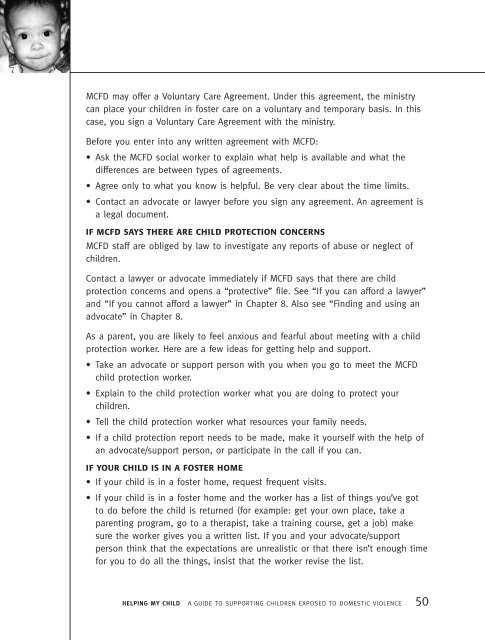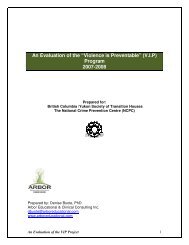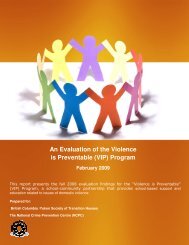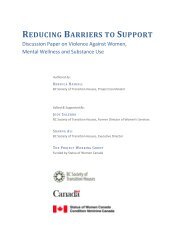a guide to supporting children exposed to domestic violence
a guide to supporting children exposed to domestic violence
a guide to supporting children exposed to domestic violence
Create successful ePaper yourself
Turn your PDF publications into a flip-book with our unique Google optimized e-Paper software.
MCFD may offer a Voluntary Care Agreement. Under this agreement, the ministry<br />
can place your <strong>children</strong> in foster care on a voluntary and temporary basis. In this<br />
case, you sign a Voluntary Care Agreement with the ministry.<br />
Before you enter in<strong>to</strong> any written agreement with MCFD:<br />
• Ask the MCFD social worker <strong>to</strong> explain what help is available and what the<br />
differences are between types of agreements.<br />
• Agree only <strong>to</strong> what you know is helpful. Be very clear about the time limits.<br />
• Contact an advocate or lawyer before you sign any agreement. An agreement is<br />
a legal document.<br />
IF MCFD SAYS THERE ARE CHILD PROTECTION CONCERNS<br />
MCFD staff are obliged by law <strong>to</strong> investigate any reports of abuse or neglect of<br />
<strong>children</strong>.<br />
Contact a lawyer or advocate immediately if MCFD says that there are child<br />
protection concerns and opens a “protective” file. See “If you can afford a lawyer”<br />
and “If you cannot afford a lawyer” in Chapter 8. Also see “Finding and using an<br />
advocate” in Chapter 8.<br />
As a parent, you are likely <strong>to</strong> feel anxious and fearful about meeting with a child<br />
protection worker. Here are a few ideas for getting help and support.<br />
• Take an advocate or support person with you when you go <strong>to</strong> meet the MCFD<br />
child protection worker.<br />
• Explain <strong>to</strong> the child protection worker what you are doing <strong>to</strong> protect your<br />
<strong>children</strong>.<br />
• Tell the child protection worker what resources your family needs.<br />
• If a child protection report needs <strong>to</strong> be made, make it yourself with the help of<br />
an advocate/support person, or participate in the call if you can.<br />
IF YOUR CHILD IS IN A FOSTER HOME<br />
• If your child is in a foster home, request frequent visits.<br />
• If your child is in a foster home and the worker has a list of things you’ve got<br />
<strong>to</strong> do before the child is returned (for example: get your own place, take a<br />
parenting program, go <strong>to</strong> a therapist, take a training course, get a job) make<br />
sure the worker gives you a written list. If you and your advocate/support<br />
person think that the expectations are unrealistic or that there isn’t enough time<br />
for you <strong>to</strong> do all the things, insist that the worker revise the list.<br />
HELPING MY CHILD A GUIDE TO SUPPORTING CHILDREN EXPOSED TO DOMESTIC VIOLENCE 50






